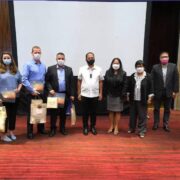
For five days, delegates from Israel’s Ministry of Health met with Philippine COVID-19 task force officials, members of the local medical community and representatives from the private sector to discuss the challenges being confronted in the implementation of the National Vaccination Program.
The Israeli delegation also visited some of the country’s top cold chain and logistics management companies as well as vaccination sites in Metro Manila to assess their capacities and provide recommendations on how to further improve their operations.
During an exit conference between the Israeli health experts and their Philippine counterparts on Friday, June 25, Adam Nicholas Segal, logistics and operations manager of Salomon Levid & Elstein Ltd, noted some key factors that need to be considered in the country’s vaccination program.
Segal said these factors include the archipelagic nature of the Philippines, the nation’s diversified population, socio-cultural conditions, and the specific requirements of international organizations that are involved in the country’s vaccine rollout.
“There should be a good combination of diversified strategies that can match the unique requirements of the Philippines in the vaccination program,” said Segal.
Logistics and cold-chain solution
The Israeli delegation was impressed with the level of professionalism of the country’s logistics and cold-chain service providers. In particular, they admired the private logistics firms’ “level of understanding” and ability to address issues as they arise.
“We didn’t know what to expect when we came here but we’re really impressed. It seems that you have very well planned, you thought about it all, it’s not like we came here and we discover missing bits and pieces. You have it all placed,” said Dafna Segol, a consultant on healthcare policy and innovation.
The Israeli health experts also suggested some areas of improvement, particularly on the guidelines set by the national government for logistics companies, which may affect the coverage and expansion of the vaccine roll out.
“At all times, it is important to abide by the most updated and try not to place more stringent requirements,” said Segal while emphasizing the need for reliable, real-time data to develop a more “logistics-friendly system.”
Health Undersecretary and chair of the National Vaccination Operations Center (NVOC) Myrna Cabotaje responded by saying the government will come up with “less stringent rules in cold chain solution.
”The Israeli delegation also stressed the need to simplify the delivery and distribution of vaccines through the establishment of warehouses, as well as packaging the trays or vials in smaller units while keeping them chilled. This system would be crucial, especially in transporting and deploying the vaccines to rural communities, as the vials will have minimal movement because of the smaller packaging.
National Task Force against COVID 19 Chief Implementer and vaccine czar Secretary Carlito Galvez requested for samples of the small vials which can be reproduced and used in the Philippines. “We look forward to seeing the sample vials that you will be sending so we can replicate and use them in our vaccine roll out,” Galvez said.
“This novel idea will be helpful in managing our vaccine supplies with the steady arrival of bigger vaccine doses from Moderna, Pfizer, J&J, and other types of vaccines in the coming weeks and months,” he added.
Ancillary supplies
The Israeli experts also advised the government to develop a more efficient system for securing and deploying ancillary supplies such as syringes.
Segal pointed out that sourcing these supplies from different suppliers and manufacturers outside the country can be challenging, thus the need for a more systematic procurement and deployment strategy.
This approach will prevent incidents wherein the vaccine doses are deployed to provinces and regions without the necessary ancillary supplies.
Cabotaje said that the government already has a procurement plan for ancillary supplies for government-purchased vaccines such as Pfizer-BioNTech.
Testing
The Israeli delegation likewise underscored the importance of testing and how it effectively complements the vaccination roll out.
“The more tests, regardless of how many you vaccinate, the better information, the better informed anyone can be on the exact situation and to be able to pinpoint where more efforts need to be made,” said Segal. Galvez asked the Israeli experts how their country conducts its testing, noting that RT-PCR results are released within four hours.
“We want to know more about your testing and how you extract samples so we can unburden the psychological effects of being in quarantine facilities especially for our OFWs,” he said.
Data management
According to Segal, data management is a key success factor of any vaccination program, as it provides a focused approach on how to manage and streamline operational systems and procedures.
He pointed out that consolidating data coming from different regions is integral in the vaccine deployment. Segal, on the other hand, lauded the Philippine government for having the ability to gather and consolidate information every 24 hours though this process may still pose certain challenges.
Galvez said that the NTF is working on developing its capacity to post real-time data and updates.
He said that a concern the task force is trying to address is the transmission of information from the provincial to the national level.
Opening up to tourists and travelers The Israeli team also offered recommendations on how the national and local governments can safely reopen their tourism and leisure sectors, which are major contributors to the country’s economy.
“The next challenge is the opening of tourism and eventually, opening of airports and ports. You have to have effective testing that is both accurate and fast that will allow tourists to enter the country,” said Segal.
Meanwhile, Avraham Ben Zaken, Deputy director general of the Ichilov Medical Center, said that reopening the country’s economy should be done in a gradual manner.“Opening must be very slowly, it needs to be connected to the amount of people who are ill and the situation in the hospital,” said Zaken.
Highly-appreciated lessons
The COVID task force officials expressed their gratitude to the government of Israel for sending its health experts to the country.
“We learned and we were impressed with the coaching session on data management and on-time delivery and the many strategies we picked up. Many good practices which we can adapt, improve on or tweak,” said Cabotaje.
She said the lessons learned from the experiences of Israel would allow the task force to review existing processes and make them better, faster, simpler, and more efficient.
“With the improvements of our vaccine operations, we can learn to live with the virus because it’s here to stay,” Cabotaje added. For his part, Galvez said that he is pleased to hear from the Israeli experts that the Philippines’ vaccination program is “nearing with their (Israel) standards.”
He said that the recommendations from the delegation has certainly provided a major boost to the country’s National Vaccination Program, as well as its Prevent-Detect-Isolate-Treat-Reintegrate (PDITR) Strategy.
_
(Press Release from the National Task Force Against COVID-19)






